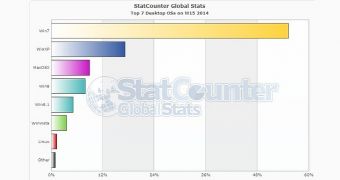Microsoft pulled the plug on Windows XP on April 8 and warned that computers running this particular OS version will no longer receive updates and security patches, so they could easily become vulnerable to attacks in case an unpatched vulnerability is being found.
Although that’s clearly a major risk that millions of users could face unless they upgrade, statistics provided by analytics firms across the world show that only a few of those who were still running Windows XP on April 8 were actually afraid that their computers could get hacked.
StatCounter data for the week after April 8 shows that XP still holds a 17.18 percent market share, enough to maintain the second position in the top operating systems worldwide chart.
Keep in mind that StatCounter’s figures are different from those provided by Net Applications, so Windows XP lost approximately 1 percent of its market share in the last 30 days.
Windows 7 obviously continues to be the clear leader on the market with 55.22 percent, also thanks to the number of Windows XP users who decided to migrate to a newer operating system, while Windows 8 and 8.1 are still far behind with 7.89 and 5.05 percent, respectively.
According to various reports that reached the web lately, Windows 7 is the preferred destination for the majority of Windows XP users who decide to upgrade, so it’s naturally to expect to see this version’s market share going up significantly in the next couple of months. Windows 7 is now powering more than 1 in 2 desktop computers worldwide, even though Microsoft has invested a fortune to bring users on its modern Windows versions, namely 8 and 8.1.
The problem with Windows XP’s large market share is that the security risks of staying on an unsupported operating system are definitely real, so users should at least consider some ways to keep their computers protected if they do not plan to upgrade to a different OS anytime soon.
Security experts have recommended Windows XP users to deploy a third-party security solution that still receives updates, as the majority of vendors out there confirmed that their anti-virus products, firewalls, and security suites would continue to work on Windows XP for at least two more years.
At the same time, you should also replace Internet Explorer with a browser that still works on Windows XP and will receive support for a little bit longer, such as Chrome and Firefox. Last but not least, make sure that you’re staying away from suspicious content that could be used to exploit flaws in the operating system.

 14 DAY TRIAL //
14 DAY TRIAL //